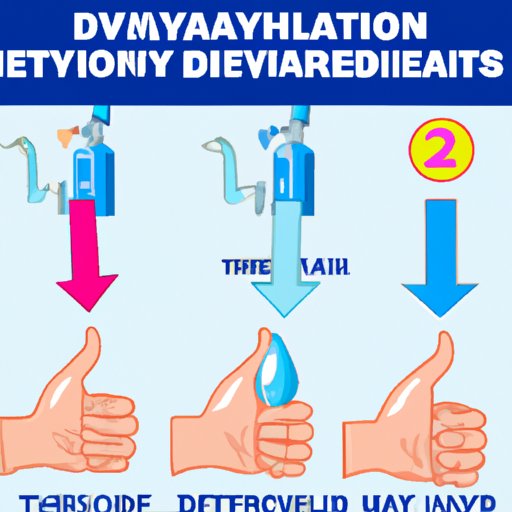
Introduction
Most people don’t realize they’re dehydrated until they start feeling thirsty. However, dehydration is a serious issue that can lead to a variety of health problems, including headaches, dizziness, and fatigue. This article will provide you with information on how to tell if you are dehydrated and offer tips for ensuring proper hydration levels.
Symptoms of Dehydration
One of the most common and obvious signs of dehydration is feeling thirsty. Other signs include a dry mouth and lips, headache, dizziness or lightheadedness, fatigue, and concentrated and dark urine. The severity of dehydration can range from mild, where you may just feel thirsty, to severe, which can lead to confusion, seizures, and even death.
The Importance of Hydration
To function properly, our bodies need water. Water is essential for regulating body temperature, transporting nutrients and oxygen to cells, lubricating joints, and removing waste. Drinking enough water helps to keep your skin clear, your immune system strong, and your digestive system functioning properly. Staying hydrated is essential for good health.
Clear vs Cloudy: Comparing the Appearance of Urine
The color and clarity of urine can tell you a lot about your hydration levels. Clear urine is a sign that you’re well hydrated, while cloudy urine can indicate that you’re dehydrated or there may be an underlying health issue. A chart or infographic can help visually display the different colors and what they mean.
The Role of Electrolytes in Hydration
Electrolytes are minerals that help regulate fluid balance in your body. They help to keep you hydrated by helping your body absorb water more efficiently. Foods that are high in electrolytes include bananas, avocados, and coconut water. It’s important to replenish electrolytes after sweating excessively or exercising to replenish the minerals lost.
Hydration Tips for Athletes
Athletes and active individuals need to drink plenty of water to stay hydrated and perform at their best. It’s recommended to drink 17-20 ounces of fluid 2-3 hours before exercise, an additional 8 ounces 20-30 minutes before starting exercise, and 7-10 ounces every 10-20 minutes during exercise. After exercise or sweating, it’s important to replenish fluids and electrolytes.
Food and Drinks that Help Keep You Hydrated
While water is the best option for staying hydrated, there are also many foods and drinks that can help keep you hydrated throughout the day. Fruits and vegetables that are high in water content, such as watermelon, cucumbers, and oranges, can help you stay hydrated. Additionally, coconut water and herbal teas are great alternatives to sugary drinks that can dehydrate you.
Conclusion
Overall, it’s important to be aware of your hydration levels and take the necessary steps to stay hydrated. Drinking enough water, eating foods high in water content, and replenishing electrolytes are all important steps in staying hydrated. With these tips, you can ensure that you stay healthy and hydrated all year round.
For additional information on staying hydrated, check out resources like the CDC and the Mayo Clinic.





